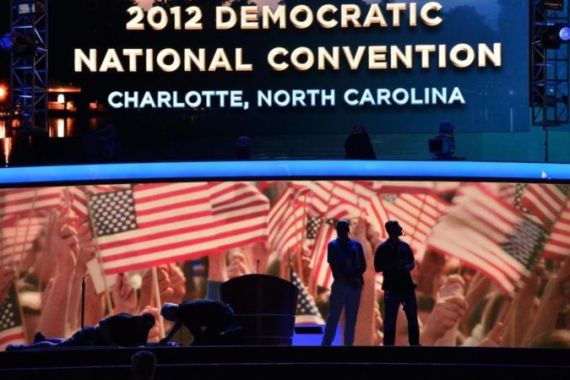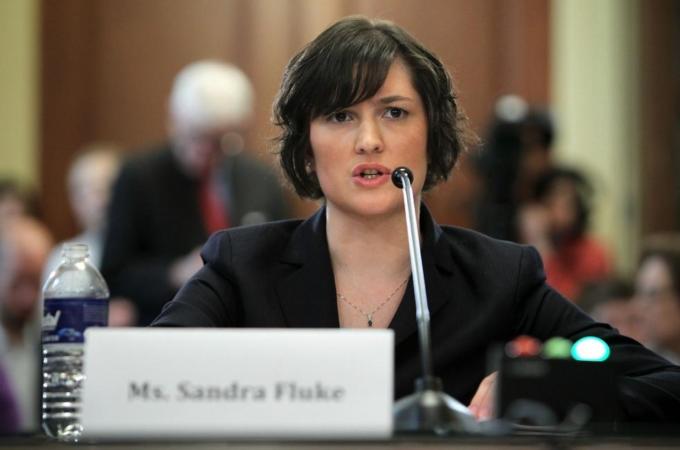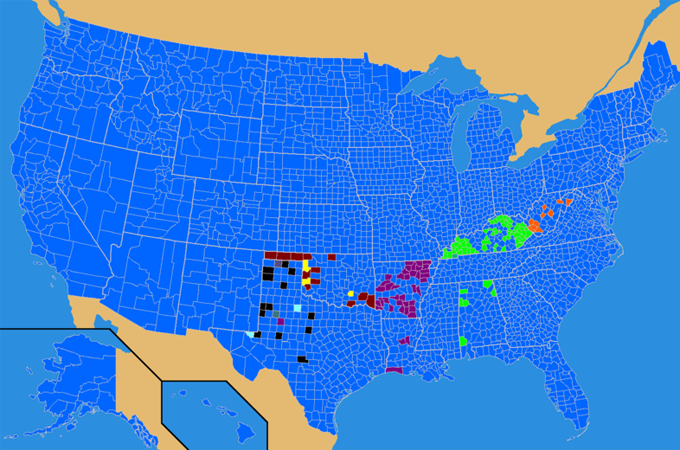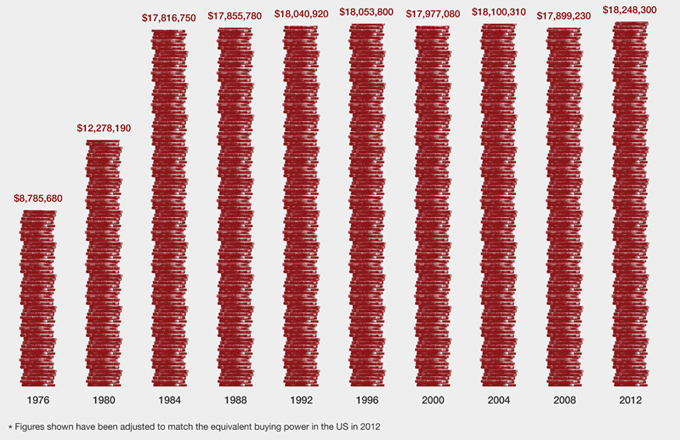Explainer: Inside the Democratic convention
From bigwigs to the rank-and-file, Democrats will converge in Charlotte, North Carolina, for a quadrennial party powwow.

There’s no doubt that US President Barack Obama will be nominated for re-election at the Democratic National Convention in Charlotte, North Carolina.
The convention, which will be held from September 4-6, will be a spotlight for Democratic warhorses and rising stars alike to pump up their party, praise their president and pad their own future prospects.
Political observers are keeping an eye on Julian Castro, the charismatic mayor of San Antonio, Texas. Castro, whom some have dubbed the “Hispanic Obama”, is slated to give the keynote speech on the convention’s opening night at Time Warner Cable Arena. On the last day of the three-day convention, Obama will deliver his acceptance speech at Charlotte’s Bank of America Stadium.
One goal of the convention will be to remedy the Democrats’ lackluster enthusiasm this election cycle. According to a Gallup poll taken last month, only 39 per cent of Democrats are “more enthusiastic than usual” about this election, compared to 51 per cent of Republicans.
About 50,000 people are expected to travel to Charlotte for the convention, including delegates, protesters, journalists, and National Guardsmen.
Swing state
Choosing Charlotte – a major financial hub and the biggest city in North Carolina – as the site of the convention is also a strategic political decision. In the 2008 presidential election, North Carolina narrowly voted for Barack Obama, the first time the state had chosen a Democrat since 1976.
However, as John Davis – the editor of the John Davis Political Report and a non-partisan political analyst based in North Carolina – notes, 2008 was an outlier. President George W Bush had abysmal approval ratings, Republicans “took the state for granted” – and Obama only won by a razor-thin margin of 14,000 votes out of 4.2 million cast.
Now, Republican presidential nominee Mitt Romney is running slightly ahead of Obama in state polls, and Davis expects Romney will likely win the state. “Obama can still win the White House; he’s just not going to do it with North Carolina’s help”.
In the US, candidates need to garner a majority of the country’s 538 electoral votes to win the presidency. The winner of North Carolina will be awarded a relatively rich prize of 15 electoral votes.
| Who’s speaking? |
Aside from Obama, a long list of politicians and activists are scheduled to speak at the convention. Some represent key swing states the Democrats hope to win; others are passionate advocates of issues such as financial reform or women’s rights; still others are personal friends or close colleagues of Obama.
Keynote speaker
Julián Castro: The 37-year-old mayor of San Antonio, the seventh-biggest city in the US, will give the convention’s keynote speech – the same platform that rapidly catapulted Obama to national prominence at the Democrats’ Boston convention in 2004. The Mexican-American rose from humble roots to graduate, like Obama, from Harvard Law School.
Friends of Obama
 |
| California attorney general Kamala Harris [Reuters] |
Kamala Harris: One of Obama’s earliest supporters, she campaigned for him during his 2004 Senate race in Illinois. Harris is California’s first female, Indian-American and African-American attorney general. A prominent supporter of housing reform, Harris sponsored the recently passed California Homeowner Bill of Rights, designed to slow the state’s high foreclosure rate.
Rahm Emanuel: The fiery-tempered Emanuel, Obama’s former chief of staff and the epitome of the political insider, left the White House in 2010 to run successfully for mayor of Chicago. His speech is expected to discuss Obama from the perspective of an Oval Office adviser.
Deval Patrick: Massachusetts Governor Deval Patrick has known Barack Obama for about two decades; they first met in Chicago when Patrick was working for the Department of Justice’s Civil Rights Division and Obama was a community organiser. Patrick, one of only four black governors in US history, campaigned for Obama in 2004 and endorsed him early on in the 2008 Democratic primaries.
Swing states
Tim Kaine: Kaine, who recently served as governor of Virginia and the chairman of the Democratic National Committee, is running for one of Virginia’s US Senate seats this year. In 2008, some had speculated Obama might choose Kaine as his running mate.
Ted Strickland: The former governor of Ohio lost in a close election in 2010. Obama and Romney are running neck-and-neck in Ohio, a populous battleground state that offers the winner 18 electoral votes.
John Hickenlooper: Colorado’s Democratic governor, Hickenlooper also spoke at the 2008 convention, when he was the mayor of Denver. Obama and Romney are virtually tied in Colorado.
The issues
Elizabeth Warren: A law professor at Harvard University and expert on bankruptcy law, Warren is running in this election cycle’s most prominent and expensive Senate race, in the northeastern state of Massachusetts. Warren, who set up the Obama administration’s newly created Consumer Financial Protection Bureau, has become an icon for advocates of financial reform. Although Massachusetts is a liberal state, the Republicans’ telegenic and moderate incumbent, Scott Brown, is running roughly even with her in polls.
 |
| Women’s rights activist Sandra Fluke [GALLO/GETTY] |
Sandra Fluke: Fluke, a student at Georgetown University Law School, testified before Congress in February in support of new regulations supported by Obama that would require health insurance plans to cover contraception, saying that birth control could cost women up to $3,000 throughout law school. Shortly afterwards, Fluke became a household name when conservative radio host Rush Limbaugh repeatedly denounced her on his show as a “slut” and a “feminazi” for her testimony – causing Democrats to rush to her defence.
Lilly Ledbetter: Ledbetter, a former manager at Goodyear Tire and Rubber Company, was a plaintiff in a lawsuit in which she claimed Goodyear paid her much less than male employees despite holding similar positions. The lawsuit eventually made its way to the Supreme Court, which decided in Goodyear’s favour. The case lead to Congress passing the Lilly Ledbetter Fair Pay Act in 2009, which extended the statute of limitations for pay discrimination cases.
Other notables
Bill Clinton: The popular ex-president is husband of Secretary of State and one-time Obama rival Hillary Clinton. He presided over a booming economy and budget surpluses during his time in office and is slated to give a primetime speech that formally places Obama as the presidential nominee. Meanwhile, Hillary Clinton will be travelling in Asia – the first Democratic convention she has missed since 1968, according to Reuters.
John Kerry: A four-term senator from Massachusetts, Kerry won the Democratic nomination in 2004 but lost the presidential election to Republican George W Bush. At the convention, Kerry will deliver a speech on national security and Obama’s foreign policy.
| The primaries |
This year’s Democratic primaries represent a stark contrast with those in 2008, when Barack Obama and Hillary Clinton duked it out for months before Obama finally won the nomination. The party’s 2012 primaries were essentially uncontested, with Obama the only major candidate running. Below, the counties shaded in blue were won by Obama in the 2012 Democratic primary – not the presidential election.

Blue counties were won by Obama, who performed poorly in many 2012 Democratic primaries in the south [Gage/Wikimedia Commons]
Although Obama had no major opponents in the primaries, the map above shows that Democrats in some conservative southern states are not thrilled with the incumbent president.
In West Virginia, 41 per cent of primary voters cast their ballots for Keith Russell Judd, who is currently serving a 210-month prison sentence in Texas. Forty-two per cent of Kentucky Democrats voted for “Uncommitted”. The same portion of Oklahoma Democrats plumped for four minor candidates, including 18 per cent for anti-abortion radical Randall Terry.
Of course, Obama’s thin majorities in these states was partly due to ultra-low turnout – few Democratic voters show up when they know their candidate will win.
| Footing the bill |
The Democrat and Republican conventions combined will cost US taxpayers an estimated $136m this year. Congress allocated $50m for security costs for each event, and the Federal Election Commission provided about $18m to each major party to cover the costs of holding the conventions. After a steep rise from 1976-84, the amount of taxpayer subsidies given to cover convention costs (adjusted for inflation) has since remained roughly the same:

Among the city of Charlotte’s expenses are $1.7m on a “central command centre” and more than $300,000 for police bikes. The city has also reportedly bought a $10m insurance policy to cover potential lawsuits.
Charlotte has passed new laws in advance of the convention that ban camping in public parks and restrict several potential protest items, such as masks, bars, and pepper spray.
Local businesses, however, are expecting an influx of customers. According to Robyn Hamilton, the director of business relations for the Charlotte host committee, the economic impact of the convention may be somewhere between $150m to $200m.